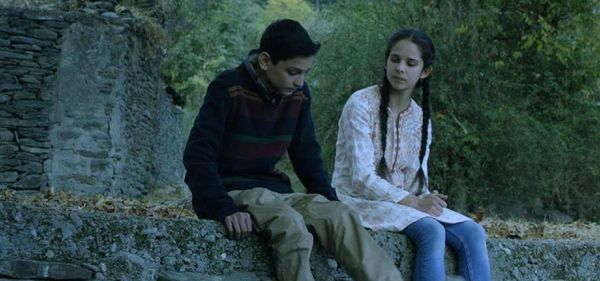Eye For Film >> Movies >> No Fathers In Kashmir (2019) Film Review
No Fathers In Kashmir
Reviewed by: Jane Fae

No Fathers in Kashmir is a touching, funny, highly informative delve into the politics of modern Kashmir and the dilemmas facing its post-partition Muslim population, as seen through the eyes of a naïve observer. In this case, the eyes are those of Noor (Zara Webb), a girl of 16 who has spent most of her formative years in London after her father 'went away' when she was very little.
As we quickly discover, far from the average tale of parental abandonment, Noor's father turns out to have been the victim of government-inspired 'disappearances': the fate of many young men who opposed – or were thought likely to oppose – Indian rule.

The film serves up a multi-level exploration of the personal, the political and the interplay between the two. At its heart is conflict: between army and 'terrorists' - or militants: it all depends on whose side of the divide you sit. Between mother, who wants her husband's disappearance made official by a death certificate - and grandparents who do not, unless, until the government acknowledges their own part in what happened.
Conflict, too, with Arshid (Ashvin Kumar), one time friend and contemporary of Noor's father. He has now turned to a more fundamental Islam in reaction to the loss of friends and his own torture, and this puts him at odds with Noor's grandfather, Abdul (Kulbhushan Kharbanda), advocate of a gentler, more mystical approach to religion.
It is, too, about friendship and selfishness. Shortly after arriving, Noor encounters Majid (Shivam Raina), a boy the same age as her, who has also lost his father. This brings them together on a quest to find the graves of the missing men. But for a multitude of reasons – the privilege of having grown up in a safe Western environment, the naivety of youth, simple lack of comprehension of Kashmiri culture - Noor does not understand the dangers of the path on which she is embarked.
Why should she? She is just an ordinary London teen, constantly on the look out for interesting images with which to populate her social media. Coming across a family photo album stripped of photos, she is aghast. The very idea of destroying your past is alien to her.
To her grandfather, though, it is necessary evil: we “wiped the history of our people with our own hands,” he explains, to protect the identities of those who had been friends with her father and who might be put at risk as a result.
And so it is that Noor, in her naivety and self-absorption, leads Majid into danger. On an expedition to the mountains to find the place where their fathers are buried, the pair are captured by the army. Noor, with her British passport and connections to authority, is released - Majid held, to be tortured. Out of spite. As example to others.
A tale of historic wrongs continuing into the present. And a film that bears watching and watching again. Because there are no easy answers here: just a deeply thought-provoking meditation on jihad, national struggle and the morality of the choices we make when we are powerless. All set against the backdrop of sensitive filming, stunning scenery and a beautiful soundtrack by French composers Loic Dury and Christophe Mink, including their version of the traditional Cholhama Roshay song, as performed by Ali Safuddin.
Given the subject matter and the difficult conversation this film set out to begin, it is no surprise that it was held up for a number of years by Indian Government pressure and the official censor. But director and producer Ashvin Kumar was not about to give up. He persevered and it is a good thing that he did.
Reviewed on: 22 Jan 2020

















